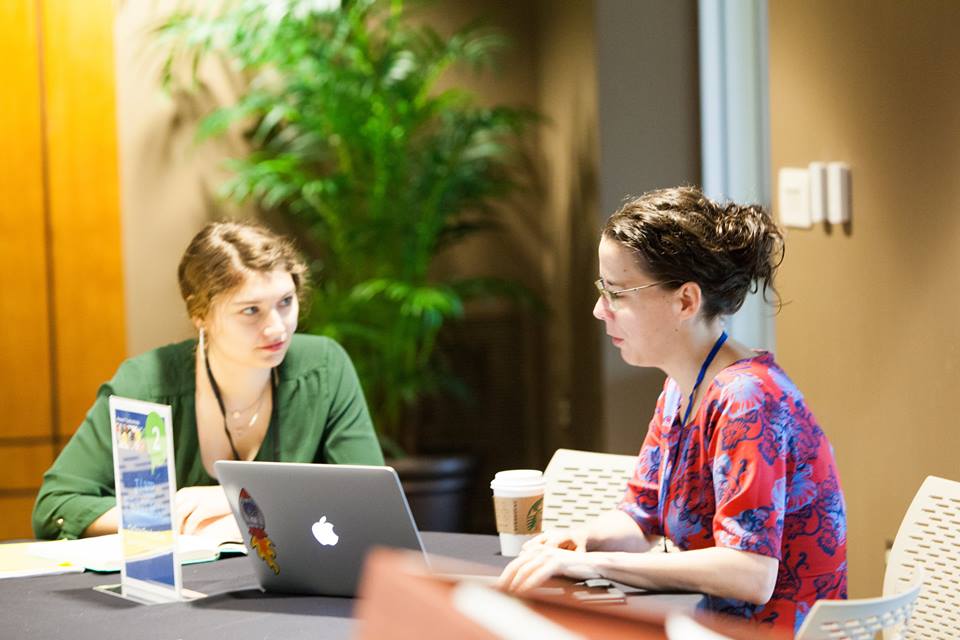
TL;DR: Over 15 years, I have watched the Midwest Writers Workshop fulfill its mission to nurture writers. While others may not or cannot forgive them for a recent terrible incident, I am able to forgive. I will continue to speak at the conference, and help it grow and evolve into a stronger organization.
(For those who need a summary of what happened, Google can assist you.)
Update (Jan. 20, 2o18): Midwest Writers Workshop has been canceled for 2018. Its future remains uncertain.
Early in my publishing career, in 2003, my boss at Writer’s Digest emailed me with a link to a writing conference in Muncie, Indiana, at Ball State University, known as the Midwest Writers Workshop. Her appended note: “Lunch keynote speaker is TBD. Suggest yourself.”
I had no experience as a conference speaker, nor much writing and publishing experience, but my boss wanted to see Writer’s Digest have a presence at such events. And I was the type of employee who did as she was told, despite the fact I thought it was a brazen approach that would be met with rejection (or silence). These people didn’t know who I was, nor should they. But the Writer’s Digest brand was a known quantity, and the director responded positively, granting me the keynote slot.
I still have the presentation slides I used that day, but the talk was nothing special. Surprisingly, I felt natural and at ease. It helped that I was originally from rural Indiana and had gone to high school in Muncie—but it was more than that. The welcome and the warmth from the organizers created an environment that just felt good to be in. After 2.5 days together, everyone was like family. (I also got to meet and have dinner with George Plimpton, who was the closing keynote, but that’s a story for another time.)
To my surprise, MWW invited me back the following year. And the year after that. And again. I have spoken every year at MWW for 15 years. Their evolution during this time has been remarkable. MWW started inviting agents and editors to hear pitches; they added a Ball State internship program; they were pushed by faculty and advisers to become more diverse, and still work on this, just as literary agencies and traditional publishers do. Occasionally, I’ve suggested they shouldn’t have me back every year—I must be a boring and tired messenger by now and I’m not needed. But the conference values continuity, and that feeling of family was not a fluke I experienced that first year. They have loyal writer-attendees who return season after season, very much in the spirit of a reunion.
Indeed, I am deeply fond of MWW and appreciate its mission to foster and formalize a writing and literary community in the Midwest, a mission I believe is invaluable to the region and country at large. As a child and teenager who grew up in a remote corner of Indiana, without writing groups, bookstores or a literary culture of any kind, that makes it more important and special to me, a much needed light.
MWW is not without its flaws or challenges, of course. In the last few years, as they’ve become more independent of Ball State, they’ve faced difficult decisions about strategic direction and administration. These questions remain largely open, and I’ve specifically been advising them on how to pursue additional income to sustain the organization. But it never occurred to me, until last week, that there might be a future entirely without Midwest Writers Workshop. It’s for that reason that I’m writing and publishing this love letter.
My career, almost in its entirety, has been spent in service to writers and the writing and publishing community. I’ve attended hundreds of conferences over the years, and while they all have wonderful success stories (and their own special qualities), Midwest Writers has always been the event I go “home” to each year, to hit my own reset button and remember why I do the work that I do. I’ve watched writer-attendees from my very first years flourish into full-time authors, who then return as faculty—and sometimes join the committee. There is a strong tradition of giving back, of helping another writer up the ladder. The spirit is one of generosity and warm-heartedness.
Given that tradition, it’s why recent events have been so painful to watch unfold, as they are not characteristic of the event, its leadership, or its legacy. It would be a significant loss to have Midwest Writers forever remembered in such a way. While the people who have been most deeply hurt may not be able to forgive what has happened, I am able to give it another chance. Like every organization, MWW can improve and become better. It has exhibited its capacity to change in the past, and many more writers can yet benefit from it in the future—and I include myself among them.

Jane Friedman has spent nearly 25 years working in the book publishing industry, with a focus on author education and trend reporting. She is the editor of The Hot Sheet, the essential publishing industry newsletter for authors, and was named Publishing Commentator of the Year by Digital Book World in 2023. Her latest book is The Business of Being a Writer (University of Chicago Press), which received a starred review from Library Journal. In addition to serving on grant panels for the National Endowment for the Arts and the Creative Work Fund, she works with organizations such as The Authors Guild to bring transparency to the business of publishing.
